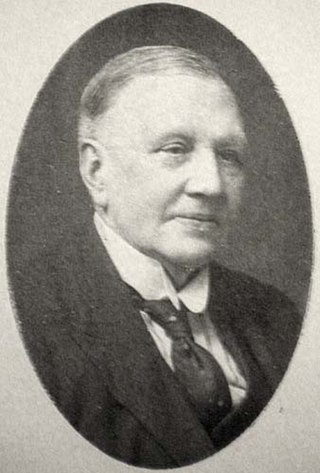Related Research Articles

Mansfield College, Oxford is one of the constituent colleges of the University of Oxford in Oxford, England. The college was founded in Birmingham in 1838 as a college for Nonconformist students. It moved to Oxford in 1886 and was renamed Mansfield College after George Mansfield and his sister Elizabeth. In 1995 a royal charter was awarded giving the institution full college status. The college grounds are located on Mansfield Road, near the centre of Oxford.
Sir Thomas Henderson was a Scottish Liberal Party politician and businessman.
Stubbington House School was founded in 1841 as a boys' preparatory school, originally located in the Hampshire village of Stubbington, around 1 mile (1.6 km) from the Solent. Stubbington House School was known by the sobriquet "the cradle of the Navy". The school was relocated to Ascot in 1962, merging with Earleywood School, and it closed in 1997.

Sir Alfred Hamilton Grant, 12th Baronet, known as Hamilton Grant, and from 1918 as Sir Hamilton Grant, was a British diplomat who served primarily in India. He was also briefly a Liberal Party politician.
Sir George Sidney Bishop CB OBE was a British civil servant and businessman.

Sir Robert John Collie was a Scottish medical doctor and public servant who also served as National Liberal Party MP for Glasgow Partick from 1922 to 1923.
William Rees-Thomas CB FRCP FRSM was a Welsh psychiatrist. He was Medical Senior Commissioner for the Board of Control for Lunacy and Mental Deficiency.
Sir Philip Bridger Proctor KBE was a British businessman who served as Director of Meat Supplies, Ministry of Food, 1919–21. For his wartime service, he was knighted in 1920.
Sir David Richard Llewellyn, 1st Baronet was a Welsh industrialist and financier.
Wilfrid Denys Pawson was Archdeacon of Lindisfarne from 1956 until his death.
Sir Robert Evan Owen Williams FRCP FRCPath FFPHM was a Welsh pathologist.
Philip Ernest Tindal-Carill-Worsley was an English lawyer and landowner.
His Honour John Neal MC was an English Judge and Liberal Party politician.
Francis Sheed Anderson, was a Scottish businessman, civil servant and Liberal Party politician.

Sir Frank Milton was a British Liberal Party politician and magistrate.

Philip Foale Rowsell CBE JP FCS FCII, was a pharmacist, insurance expert, British Liberal Party politician and a prominent figure in civic life in Exeter and Devon.
Sir Hubert Stanley Houldsworth, 1st Baronet, QC was a barrister, Chairman of the National Coal Board and a British Liberal Party politician.
References
- 1 2 3 'PROCTOR, Sir (Philip) Dennis’, Who Was Who, A & C Black, an imprint of Bloomsbury Publishing plc, 1920–2008; online edition, Oxford University Press, December 2012; accessed 28 Dec 2012 (subscription required)
- ↑ Panirau Mulligan, Christine (21 October 2013). "The Dunedin Hospital Art Collection: Architecture, Space and Wellbeing" (PDF). ourarchive.otago.ac.nz. Retrieved 18 December 2018.
- ↑ Peter Wright, Spycatcher: the Candid Autobiography of a Senior Intelligence Officer (New York and London: Viking, 1987), pp. 262-263 ISBN 0670820555
- Kevin Theakston, ‘Proctor, Sir (Philip) Dennis (1905–1983)’, Oxford Dictionary of National Biography, Oxford University Press, 2004; online edn, May 2009 accessed Sir (Philip) Dennis Proctor (1905–1983): doi : 10.1093/ref:odnb/60779
- 'PROCTOR, Sir (Philip) Dennis’, Who Was Who, A & C Black, an imprint of Bloomsbury Publishing plc, 1920–2008; online edn, Oxford University Press, Dec 2012 ; online edn, Nov 2012 accessed 28 Dec 2012